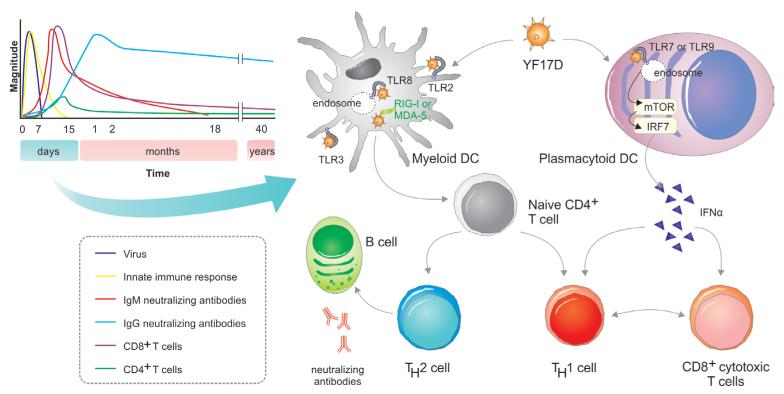Immunity to viruses: learning from successful human vaccines.
For more than a century, immunologists and vaccinologists have existed in parallel universes. Immunologists have for long reveled in using 'model antigens', such as chicken egg ovalbumin or nitrophenyl haptens, to study immune responses in model organisms such as mice. Such studies have yielded many seminal insights about the mechanisms of immune regulation, but their relevance to humans has been questioned. In another universe, vaccinologists have relied on human clinical trials to assess vaccine efficacy, but have done little to take advantage of such trials for studying the nature of immune responses to vaccination. The human model provides a nexus between these two universes, and recent studies have begun to use this model to study the molecular profile of innate and adaptive responses to vaccination. Such 'systems vaccinology' studies are beginning to provide mechanistic insights about innate and adaptive immunity in humans. Here, we present an overview of such studies, with particular examples from studies with the yellow fever and the seasonal influenza vaccines. Vaccination with the yellow fever vaccine causes a systemic acute viral infection and thus provides an attractive model to study innate and adaptive responses to a primary viral challenge. Vaccination with the live attenuated influenza vaccine causes a localized acute viral infection in mucosal tissues and induces a recall response, since most vaccinees have had prior exposure to influenza, and thus provides a unique opportunity to study innate and antigen-specific memory responses in mucosal tissues and in the blood. Vaccination with the inactivated influenza vaccine offers a model to study immune responses to an inactivated immunogen. Studies with these and other vaccines are beginning to reunite the estranged fields of immunology and vaccinology, yielding unexpected insights about mechanisms of viral immunity. Vaccines that have been proven to be of immense benefit in saving lives offer us a new fringe benefit: lessons in viral immunology.
Authors
Bali Pulendran; Jason Z Oh; Helder I Nakaya; Rajesh Ravindran; Dmitri A Kazmin
External link
Publication Year
Publication Journal
Associeted Project
Systems Vaccinology
Lista de serviços
-
Gene regulatory and signaling networks exhibit distinct topological distributions of motifs.Gene regulatory and signaling networks exhibit distinct topological distributions of motifs.
-
Gene signatures of autopsy lungs from obese patients with COVID-19.Gene signatures of autopsy lungs from obese patients with COVID-19.
-
Network Medicine: Methods and ApplicationsNetwork Medicine: Methods and Applications
-
ACE2 Expression Is Increased in the Lungs of Patients With Comorbidities Associated With Severe COVID-19.ACE2 Expression Is Increased in the Lungs of Patients With Comorbidities Associated With Severe COVID-19.
-
Drug repositioning for psychiatric and neurological disorders through a network medicine approach.Drug repositioning for psychiatric and neurological disorders through a network medicine approach.
-
Linking proteomic alterations in schizophrenia hippocampus to NMDAr hypofunction in human neurons and oligodendrocytes.Linking proteomic alterations in schizophrenia hippocampus to NMDAr hypofunction in human neurons and oligodendrocytes.
-
In-depth analysis of laboratory parameters reveals the interplay between sex, age, and systemic inflammation in individuals with COVID-19.In-depth analysis of laboratory parameters reveals the interplay between sex, age, and systemic inflammation in individuals with COVID-19.
-
The evolution of knowledge on genes associated with human diseasesThe evolution of knowledge on genes associated with human diseases
-
Network vaccinology.Network vaccinology.
-
Pyruvate kinase M2 mediates IL-17 signaling in keratinocytes driving psoriatic skin inflammationPyruvate kinase M2 mediates IL-17 signaling in keratinocytes driving psoriatic skin inflammation
-
Transcriptome analysis of six tissues obtained post-mortem from sepsis patientsTranscriptome analysis of six tissues obtained post-mortem from sepsis patients
-
Gene Signatures of Symptomatic and Asymptomatic Clinical-Immunological Profiles of Human Infection by Leishmania (L.) chagasi in Amazonian BrazilGene Signatures of Symptomatic and Asymptomatic Clinical-Immunological Profiles of Human Infection by Leishmania (L.) chagasi in Amazonian Brazil
-
In vitro morphological profiling of T cells predicts clinical response to natalizumab therapy in patients with multiple sclerosis.In vitro morphological profiling of T cells predicts clinical response to natalizumab therapy in patients with multiple sclerosis.
-
Integrative immunology identified interferome signatures in uveitis and systemic disease-associated uveitis.Integrative immunology identified interferome signatures in uveitis and systemic disease-associated uveitis.
-
Gene regulatory networks analysis for the discovery of prognostic genes in gliomas.Gene regulatory networks analysis for the discovery of prognostic genes in gliomas.
-
Revealing shared molecular drivers of brain metastases from distinct primary tumors.Revealing shared molecular drivers of brain metastases from distinct primary tumors.

